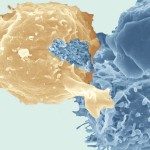Lien vers Pubmed [PMID] – 33968064
Lien DOI – 10.3389/fimmu.2021.662894
Front Immunol 2021 ; 12(): 662894
The early initiation of antiretroviral therapy (ART) in HIV-1-infected infants reduces mortality and prevents early CD4 T-cell loss. However, the impact of early ART on the immune system has not been thoroughly investigated in children over five years of age or adolescents. Here, we describe the levels of naive CD4 and CD8 T lymphocytes (CD4/CD8TN), reflecting the quality of immune reconstitution, as a function of the timing of ART initiation (early (<6 months) versus late (≥24 months of age)).The ANRS-EP59-CLEAC study enrolled 27 children (5-12 years of age) and nine adolescents (13-17 years of age) in the early-treatment group, and 19 children (L-Ch) and 21 adolescents (L-Ado) in the late-treatment group. T lymphocytes were analyzed by flow cytometry and plasma markers were analyzed by ELISA. Linear regression analysis was performed with univariate and multivariate models.At the time of evaluation, all patients were on ART and had a good immunovirological status: 83% had HIV RNA loads below 50 copies/mL and the median CD4 T-cell count was 856 cells/µL (interquartile range: 685-1236 cells/µL). In children, early ART was associated with higher CD8TN percentages (medians: 48.7% vs. 31.0%, P = 0.001), and a marginally higher CD4TN (61.2% vs. 53.1%, P = 0.33). In adolescents, early ART was associated with low CD4TN percentages and less differentiated memory CD8 T cells. CD4TN and CD8TN levels were inversely related to cellular activation and gut permeability.In children and adolescents, the benefits of early ART for CD8TN were clear after long-term ART. The impact of early ART on CD4TN appears to be modest, because pediatric patients treated late respond to HIV-driven CD4 T-lymphocyte loss by the de novo production of TN cells in the thymus. Our data also suggest that current immune activation and/or gut permeability has a negative impact on TN levels.ClinicalTrials.gov, identifier NCT02674867.




